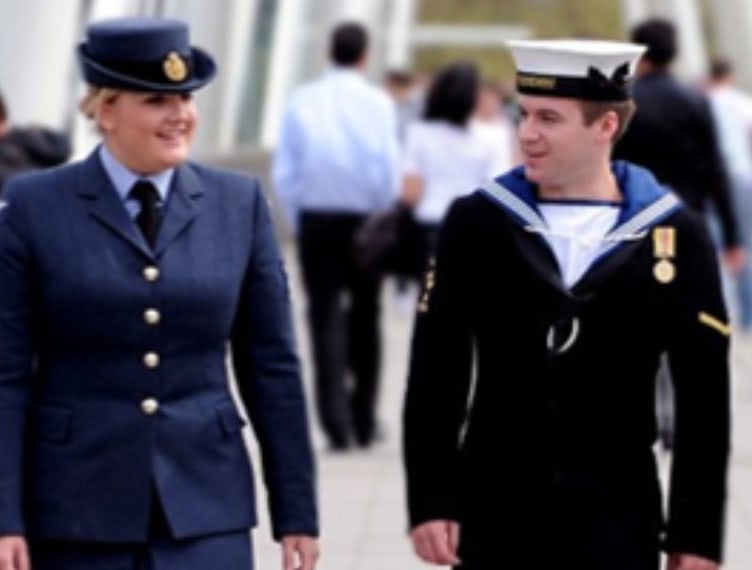Further Forces goes further still during pandemic

For some parts of our sector the Covid-19 pandemic has meant overcoming unfamiliar challenges, but for the @e_t_foundation @FurtherForces programme and the outstanding individuals that transition to Further Education through it, the adjustment has been less dramatic.
For many, online teaching was a sudden and significant change as lockdown began, but for those trained by Further Forces, online learning is natural territory. Because the programme’s teacher training is delivered by the University of Portsmouth to individuals all around England, blended learning and remote mentoring have long been the order of the day, with most engagement taking place online with additional webinars, videos and telephone support.
That experience of blended learning and pastoral support as learners, has meant the adaptation to online education as teachers has been an easier step to take. As Leigh Pickard-Morrish, Further Forces Trainee and teacher at Exeter College, explains: “The support and mentoring that the Further Forces Programme has provided continues to inform my practice. The teaching delivery model that I have developed has remained successful through the COVID-19 pandemic, through the continued delivery of online and blended knowledge modules during the lockdown.”
It’s also meant that our trainees have been able to use their experience to assist colleagues to make the switch more easily. We all recognise the value of a colleague’s experience in helping us acquire new skills and moving to online learning has been no exception.
And it’s not just in teaching and learning that Further Forces trainees have been demonstrating their adaptability. The FE and Training sector has produced numerous stories of individuals or institutions turning their skills to helping to tackle the pandemic and Further Forces Trainees, with all the resourcefulness and sense of duty you would expect of Armed Services leavers, have been at the forefront of this effort. Our trainees have swung into action to play their part, making the most of the flexibility of their own learning to support vulnerable groups and key services.
They’ve done so in a variety of ways. While completing his PGCE, Further Forces trainee Jamie Lennon was deployed to the specially built London Nightingale Hospital, where he used his expertise in virus control to help train nurses who had been deployed there. Kayhlan Norgrove, who also works as a teacher with the Prince’s Trust, has developed online content for the charity Inner Flame which supports NEET 16–25-year-olds. Amber Eckford, a trainee who teaches at Havant and South Downs College has been balancing her teaching duties with home schooling her own daughter and continuing in her unit welfare role for her army regiment, offering advice to soldiers and their families. And Chris McCosh, a Further Forces trainee who teachers at Duchy College, Cornwall, and still serves, has been part of Military Aid to Civil Authorities (MACA), requiring him to work both from home and at his barracks. These examples are just a handful of the many I could have chosen to share but illustrate well the feedback we hear about the resilient, flexible nature of our trainees and underline why we are so proud of them.
With the extension of the deadline to apply for Further Forces to the end of August because of the pandemic, the programme team is still working hard to encourage those considering applying to do so before it is too late. Events bringing together Forces personnel and FE providers that would have taken place face-to-face on either a national or regional basis have moved online during lockdown.
Working with the MoD’s Careers Transition Partnership (CTP), Further Forces holds a monthly Webex Q&A event, where over 100 personnel join the chat room to ask members of the team about any aspect of the teacher training and recruitment within Further Education. And Further Forces has also participated in the CTP-hosted national virtual employment fairs alongside potential employers including Thames Valley Police, Metro Bank and Thames Water. These events, which have attracted over 380 delegates, have mirrored physical events in featuring both main presentations about leaving the Service and smaller workshop-style sessions to enable more in-depth discussions. These activities have borne fruit and there are now over 320 service leavers at various stages of the transition from Services to FE with the programme.
That’s good news of course. With the support of the Department for Education, Further Forces is helping to bring individuals with real-world technical skills and experience into the sector, helping to fill the acknowledged skills gaps. And that’s a mission that is becoming more important than ever; while Further Forces has stood up well to the challenges of the pandemic, the economy looks like it will have taken a significant hit. The teachers that Further Forces produces will play an important role in creating a new generation of skilled workers, who will play a vital part in our nation’s resurgence, which is why it all matters so much.
For details of how you can get involved with the programme, either as a trainee or as a provider wishing to recruit technical teachers via Further Forces, visit www.et-foundation.co.uk/supporting/support-teacher-recruitment/further-forces/.
Cerian Ayres, National Head of Technical Education, Education and Training Foundation












Responses